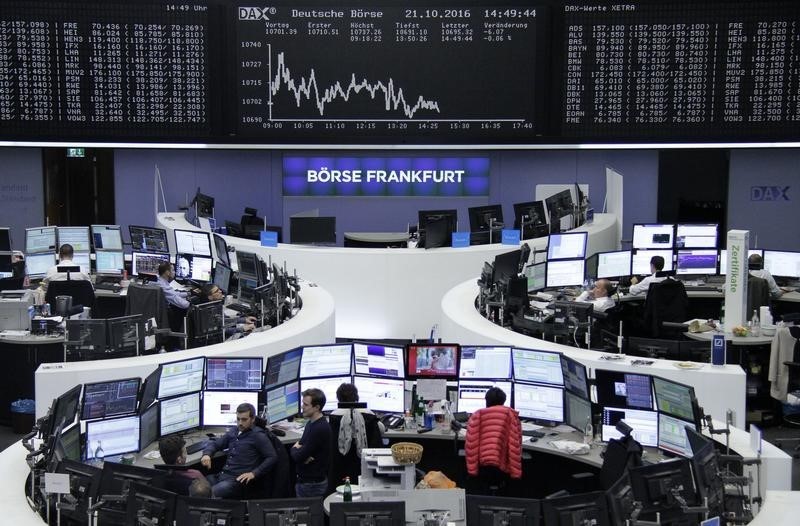By Saqib Iqbal Ahmed
NEW YORK (Reuters) - The dollar rebounded on Monday, shaking off concerns linked to an investigation that could influence the U.S. presidential election, while global equity prices steadied, helped by a buoyant Wall Street following a string of merger deals.
Oil prices slid after non-OPEC producers failed to make any specific commitment to join the Organization of the Petroleum Exporting Countries in limiting output to support prices.
The U.S. dollar rose against a basket of major currencies on reduced worries over the Federal Bureau of Investigation's investigation of emails linked to Hillary Clinton's use of a private server. Persistently low Japanese government bond yields also boosted the greenback.
The dollar suffered its worst fall in more than seven weeks on Friday following news that the FBI is reviewing fresh evidence in its probe of the Democratic presidential candidate.
"The market is maybe taking a calmer approach to the FBI probe at this point than it was on Friday afternoon," said Shahab Jalinoos, global head of FX strategy at Credit Suisse (SIX:CSGN) in New York.
A Clinton win is generally seen by analysts as likely to be a positive for the dollar, and the FBI announcement on Friday gave new hope to Clinton's Republican rival Donald Trump that he can beat her on Nov. 8.
The dollar index was up 0.31 percent at 98.655.
"This situation (Clinton email review) is going to keep the market in a very cautious trading atmosphere in this final election week," said Peter Cardillo, chief market economist at First Standard Financial in New York.
MSCI's 47-country "All World" index was little changed after paring losses from earlier in the day.
Deal news, including General Electric's merger of its oil and gas business with Baker Hughes Inc and CenturyLink's acquisition of Level 3 Communications, helped lift investor sentiment on Wall Street.
Meanwhile, U.S. consumer spending rose more than expected in September as households boosted purchases of motor vehicles and inflation increased steadily, which could bolster expectations of an interest rate hike from the Federal Reserve in December.
The Dow Jones industrial average was up 16.67 points, or 0.09 percent, to 18,177.86, the S&P 500 gained 5.47 points, or 0.26 percent, to 2,131.88 and the Nasdaq Composite added 13.32 points, or 0.26 percent, to 5,203.43.
European equities fell for a sixth straight session, with energy shares tracking weaker crude oil prices and financial stocks losing ground. Europe's broad FTSEurofirst 300 index was down 0.46 percent at 1,339.75. [
U.S. Treasury prices gained on safety buying sparked by greater uncertainty over next week's election and demand for bonds for month-end portfolio rebalancing.
Benchmark 10-year notes were up 4/32 in price to yield 1.83 percent, down from 1.85 percent late on Friday.
Oil prices slid after non-OPEC producers made no specific commitment to join OPEC in limiting oil output to prop up prices, suggesting they want the group to solve its differences first.
Brent crude was down 3 percent at $48.22 a barrel, while U.S. crude was down 4.5 percent at $47.49.

The stronger dollar pushed gold lower. Spot gold prices were down 0.17 percent to $1,273.70.